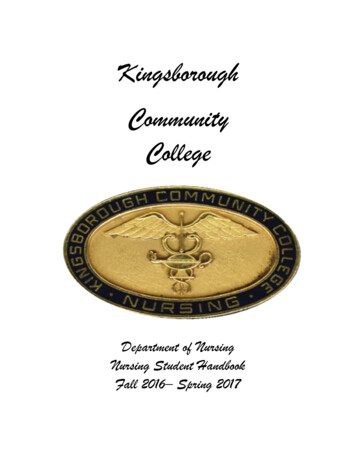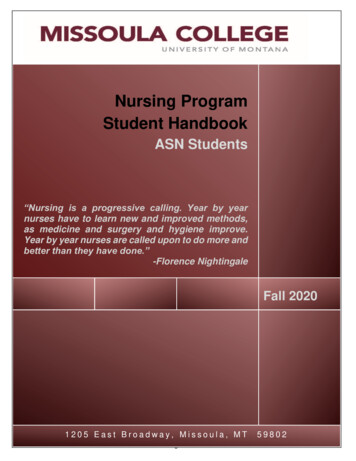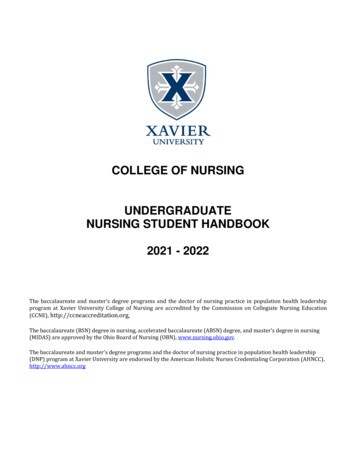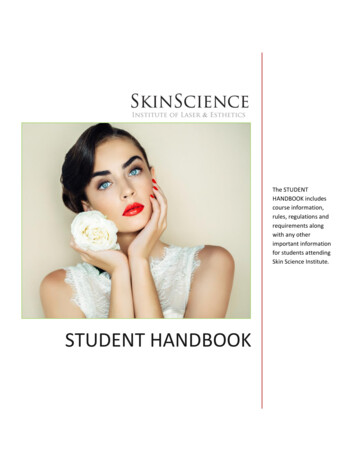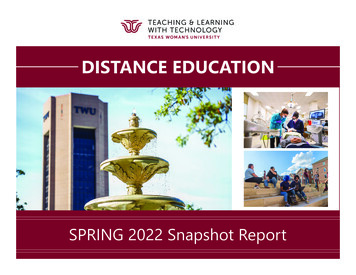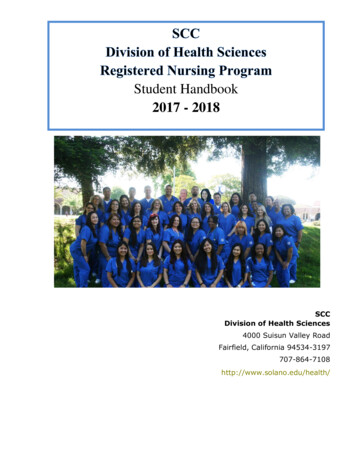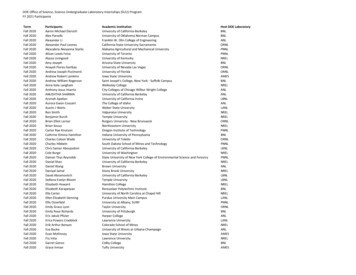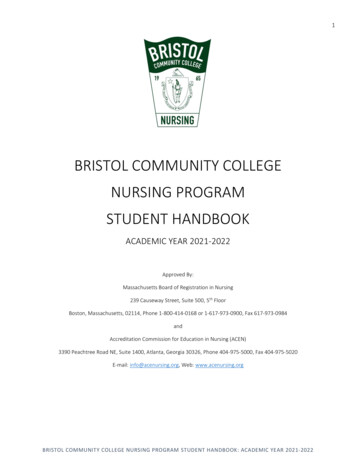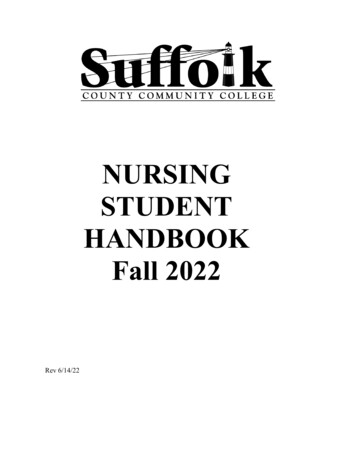
Transcription
NURSINGSTUDENTHANDBOOKFall 2022Rev 6/14/22
SUFFOLK COUNTY COMMUNITY COLLEGESCHOOL OF NURSINGUSING THIS HANDBOOKThe Nursing Student Handbook is an official document provided to each nursing student with explicitinformation on the policies, procedures and guidelines established by nursing faculty. Each student is heldresponsible for complying with the policies in the Student Policy Manual, the procedures the StudentHandbook, and all specific requirements found in the course outline and course resources. The studenthandbook is updated prior to each semester, and on an as needed basis. Students will be informed viaemail when updates have been made. Refer to the Nursing Student Policy Manual for a fulldescription of all nursing student polices. The Manual is located on the School of Nursingwebsite www.sunysuffolk.edu/nursing.The nursing programs are registered by the New York State Education DepartmentThe nursing programs are accredited by the Accreditation Commission for Education inNursing: http://www.acenursing.org3390 Peachtree Road NE, Suite 1400 Atlanta, GA 30326Phone 404-975-5000Fax 404-975-50202
TABLE OF CONTENTSMission Statement . .5End of Program Student Learning Outcomes .5Safety and Technical Standards Required . 6Additional Expenses for Nursing Students . 7Registration 7Nursing Student Records 8Student Health Policies and Requirements .8CPR /BLS Completion 8Background Check .9Professional Attire . .9Clinical Rotation Uniform and Grooming Requirements .9-10Professionalism .10Grading .11Complaint Procedure .11Grade Grievance 11Needs of Students with Disabilities .12General Testing Guidelines . .12-13Testing Guidelines: Online Remote Testing . 13-15Dosage Calculation Competency for The Nursing Program .15Lecture Attendance 16Lab Attendance .16Clinical Attendance 17Clinical Make-Up .17Clinical Lateness 17Consequences of Academic Dishonesty .18Academic Integrity Policy and Statement of Understanding .18-20Guidelines for Clinical Component ,,,20Clinical Orientation Procedure .20Clinical Skills Policy .20Guidelines for Student Reflection .20Clearance to Return to Clinical After Illness .21Writing Policy 21Student Representatives to Nursing Faculty Meetings .21The Nursing Club .22Computer Resources and Student Responsibilities 22Learning Resources Available to Nursing Students .23-24 Skills Lab Open Skills Lab Hours Faculty Office Hours College Learning Resources Academic Skills Centers Counseling Centers LibraryUnsuccessful Attempts in a Nursing Course 25Voluntary Semester Leave of Absence (LOA) 253
Voluntary Withdrawal from the Nursing Program .25Forms:Request to be Placed on a Waitlist Form (to repeat a nursing course) 26-28Voluntary Semester Leave of Absence (LOA) Request Form .29Voluntary Nursing Program Withdrawal Form .30Nursing Faculty and Laboratory Personnel Directory .31-324
MISSION STATEMENTThe Suffolk County Community College School of Nursing is committed to providing higheducational standards based on quality, safety, healthcare’s shifting paradigms, and utilizing bestpractices in nursing. We will teach students to anticipate the dynamic healthcare needs of thecommunity through promoting intellectual discovery and a commitment to social and ethicalresponsibility and cultural awareness. Our goal is to prepare students to function safely andeffectively as nurses in today’s complex healthcare environment, and to prepare graduates foracademic advancement.END OF PROGRAM STUDENT LEARNING OUTCOMESGraduating students will be able to:Practical Nursing Certificate Program1. Provide safe, quality, diverse relationship care that promotes health and isconcurrent with evidence and standards of care.2. Function in a collaborative role to provide safe care in multiple settings.3. Function within the Practical Nurse Scope of Practice in a professional and ethical manner.4. Incorporate health promotion and maintenance needs into a plan of careAssociate Degree Program1. Deliver patient and family-centered nursing care in a culturally sensitive and holisticmanner across the life-span.2. Provide safe, effective and competent nursing care that promotes the health of patientsand families.3. Participate as an effective member of the interprofessional team.4. Demonstrate professional and ethical behaviors consistent with the standards of practiceand regulatory frameworks of the registered professional nurse.5. Develop a plan of care that integrates health promotion and maintenance needs.6. Utilize evidence-based information and technology in the clinical decision-makingprocess.5
SAFETY AND TECHNICAL STANDARDS REQUIRED FOR STUDENTSENROLLED IN THE NURSING PROGRAMAll students must meet safety and technical standards with or without reasonableaccommodations. These standards include personal and professional attributes essential to theprofession in the following areas:Cognitive: Must possess the ability to collect, analyze and synthesize data, problem solve,calculate, measure and make clinical judgments to promote patient outcomes including but notlimited to: Processing information accurately and thoroughly to prioritize care Performing accurate math calculations for medication dosages Safely demonstrating application of knowledge in the clinical settingSensory: Must possess functional use of the senses: including but not limited to: Vision-ability to detect skin changes, drawing up correct quantity of medication into asyringe, and collect data from equipment, devices, displays, and monitors. Hearing-ability to listen to lung and breath sounds using a stethoscope, respond toaudible alarms and monitors, and communicate clearly in telephone conversations. Touch -ability to have tactile sensation to assess skin temperature changes and performphysical assessments. Smell - ability to detect presence of bodily odors or drainage and the presence of smoke.Motor and Physical Endurance: Must possess the ability to perform fine and gross motormovements and also possess the physical strength to provide care including but not limited to: Manipulate equipment requiring dexterity such as preparing medication injections. Transfer, turn and position patients Rapid response to emergency situations, including the ability to perform CPR Perform required duties during clinical rotations such as lifting/moving objects, bending,turning and reaching (above shoulder height)Communication: Must possess the ability to communicate through speaking, reading,understanding and writing in the English language including but not limited to: Interpret medical records Document pertinent observations legibly in English Interact effectively with health care team members Give clear and concise oral reportEmotional/Behavioral: Must possess emotional stability and the ability to function effectivelyunder stress. This includes the ability to be flexible, use sound judgment and adapt to changeincluding but not limited to: Adhere to professional and ethical behavior Deal with unexpected incidents Ability to think and act rationally a during crisis Accept constructive criticism6
ADDITIONAL EXPENSES FOR NURSING STUDENTSNursing students must incur additional out-of-pocket expenses beyond that of the Collegetuition and fees necessary for program success. Approximate costs for the additional expenseswill be posted on the School of Nursing website www.sunysuffolk.edu/nursing.REGISTRATIONStudents are admitted to the nursing program with a specific curriculum code which designates acampus and program (day, evening, advanced placement). Students must remain within theiroriginal curriculum code, program, and admitting campus. Students are not permitted to selfregister for nursing courses on a different campus and may not switch between day and eveningprograms. Under extenuating circumstances, on a seat available basis and with the permission ofthe Academic Chair, it may be possible to transfer from one curriculum code to another. It is thestudent’s responsibility to review their DegreeWorks report each semester and register for all preand/or co-requisite non-major courses. Refer to the college catalog for program requirements.Nursing students may only take one (1) clinical component of a nursing course at a time.NURSING STUDENT RECORDSA cumulative file is maintained for each student in the nursing program. Files (digital andhardcopy) are kept confidential among the nursing faculty and are not disclosed to any personsoutside of the School of Nursing (with the exception of the background check report, DOB,SSN and immunization status and titers to the requesting clinical site). Nursing student recordsare maintained for two (2) years after graduation or program withdrawal in accordance with theCollege Record and Retention Disposal Schedule. The following documents are containedwithin the file:Date of FileProgram Entry to CastleBranchDocumentAuthorization to Release InformationConfidentiality AgreementNYS Moral Character StatementStudent Handbook AcknowledgementCampus Card Application (SBUH)Laboratory Safety: Acknowledgement of Student ResponsibilitiesClinical and Laboratory Safety: Assumption of Risk & Release FormCOVID Assumption of Risk & Release FormAnnually to Castle Branch Clinical onboarding health recordsEach semester (hard copy Course verification forms, original signed clinical evaluations,file)Academic Integrity statementsAs needed (hard copy file) Performance Evaluation Skills, Counseling Forms, LOA7
STUDENT HEALTH POLICIES AND REQUIREMENTSStudents are required to comply with the health requirements of the College and the NursingProgram in order to practice in the clinical area. Students obtain clearance to attend clinical byusing the Castle Branch online document submission/verification platform. The incurred costof the clearance will be the student’s responsibility. Additional requirements may be neededdepending on the clinical site. Students who do not comply with this policy will not bepermitted in the clinical area and will be assigned a failed clinical day for each day that they arein non-compliance (two failed clinical days result in a failed final clinical evaluation and afailed final course grade). It is the student’s responsibility to make sure the health recordsare complete and maintained throughout the program.Clinical onboarding health requirements must be completed within the required/listed deadlines:1. History and Physical Examination documented on the SCCC college form completedannually and after a medical leave within time period indicated.2. Tuberculin screening with negative findings: QuantiFERON TB Gold or T-Spot TBblood test with submission of lab report results. Positive results- Follow instructionson health certificate.3. Proof of Hepatitis B vaccination or a signed waiver of declination.4. Results of Measles, Mumps, Rubella (IGG), and Varicella titers indicatingimmunity.5. Proof of Tdap immunization within the past ten years.6. Proof of Influenza vaccination including lot number, signature and address ofprovider.7. Proof of COVID vaccination and boosterCPR /BLS COMPLETIONAll students will be required to complete an American Heart Association BLS (Basic LifeSupport) for Healthcare Providers course for adult, child, and infant prior to beginning thenursing curriculum. Students are required to present proof of current BLS certification by thefirst day of clinical. Students may seek certification at any available site that offers AHA BLS(Basic Life Support) for Healthcare Providers 2-year training. Online certifications are NOTacceptable. Some suggested sites are:CPR Training NY - Smithtown631-724-3537 http://www.CPRTrainingNY.comLong Island Rescue Services –Ronkonkoma 631-737-4313http://www.lirescue.orgStudents who are not able to show proof of completion or whose BLS certification has lapsedduring the semester are considered unprepared for clinical and will earn a failed clinical day.8
BACKGROUND CHECKAs required by clinical facilities contracted by the nursing program and in keeping with a JointCommission standard, all students accepted into the nursing program must submit to abackground check through Castle Branch prior to enrollment into the first nursing course. Theincurred cost of the background check will be the student’s responsibility. Based on the resultsof these checks, an affiliated clinical site may not allow your presence at their facility in thecapacity of a student nurse. This would result in your inability to successfully complete therequirements of the program.Students are also reminded that licensing boards for certain health care occupations andprofessions may deny, suspend, or revoke a license or may deny the individual the opportunityto sit for an examination if an applicant has a criminal history or is convicted or pleads guilty ornolo contendere to a felony or other serious crime. Students should consult the New York StateDepartment of Education for more details regarding possible Board of Nursing actions relatedto personal background records. Successful completion of the Nursing Program at SuffolkCounty Community College does not guarantee licensure, the opportunity to sit for a licensureexamination, certification or employment in the relevant health care occupation.Students are required to report alleged violations of federal, state and local laws that occurredsince submission of the background check. Based on the alleged violations, an affiliatedclinical site may not allow your presence at their facility in the capacity of a student nurse.Students that fail to report alleged violations will be subject to Section 4 of the SCCC Code ofConduct that may result in interim suspension upon notification that a student is facingcriminal investigation. Students are required to complete, sign and submit the Authorization toRelease Information form prior to enrollment in the first clinical course which authorizes theCollege to release information on an as-needed basis as requested by clinical agencies.PROFESSIONAL ATTIREAll students in the Nursing Program at Suffolk Community College are expected to behave anddress in an appropriate and professional manner. Students must wear the complete school uniformin the clinical area unless a particular clinical agency indicates otherwise. The uniform may beworn on campus only when permission is given by nursing faculty. When in uniform, studentsshould be aware that they represent both the school and the profession. Student must change outof uniform before returning to campus. These guidelines are in addition to any additional dresscode requirements imposed by clinical agency affiliates.Clinical Rotation Uniform and Grooming Requirements SCCC embroidered blue scrub top and white pants/skirt.Long-sleeve shirts underneath uniform top is not permitted unless the agency requirescovering tattoos or the student has a religious exemption.9
Snap up warm up jacket with embroidered SCCC logo on front is the only approvedcovering for uniform. Warm up jacket requires removal when cleaning hands to elbows isrequired by clinical unit or patient care.Students may be required to wear hospital issued scrubs as regulated by their specialtyarea protocols (i.e labor and delivery).White pantyhose or socks.Neutral undergarments (should not be visible).Clean all white closed nursing shoes or plain white sneakers.Photo ID badge holder with SCCC ID or Hospital issued student nurse badge must bealways worn above the waist and visible. Picture and name must face outward.Hair should be groomed neatly and long hair secured above the collar of the uniform.asnot to interfere with patient contact.Masks must fit securely. Facial hair (moustache and beard) must not prevent a secure fit.Free from odors that may be offensive to patients. No perfume or tobacco odors.No chewing gum.No lash extensions or false eyelashes.Nails must be kept short, not more than ¼” beyond fingertips and clean. No artificialnails, gel polish, wraps. Clear or natural shade nail polish only, chipped nail polish isprohibited.Jewelry: Only wedding bands, watches, and 1 pair of stud earrings are permitted.No bracelets are to be worn in the clinical areas except for medical alert tags.Although recognizing individual preferences for personal expression, the School ofNursing requires students to comply with the following clinical affiliate policiesregarding piercings: Visible body piercing (tongue, eyebrow, nose, etc.) is not allowedexcept for earlobes unless cultural or religious requirements dictate.A watch with a second hand and a stethoscope. Wearable technology (i.e smartwatches)is prohibited.Recommended equipment: pen light and bandage scissorsPROFESSIONALISMProfessional behavior is expected of all Student Nurses. In addition to the SCCC Student Codeof Conduct, the following professional behaviors are expected of SCCC nursing students at alltimes and in all settings.1. Students are required to activate and check their SUNY Suffolk e-mail on a regular basis.2. Professional communication is expected of nursing students including on any form ofsocial media. Any communication which can cause harm or injury to another, or disruptsthe teaching-learning process may result in charges of misconduct which will be addressedthrough Office of the Dean of Student Services.3. Students are not permitted to text or call/answer cell phones during class, clinical, orlab unless explicit permission is granted by a faculty member for emergencypurposes.4. Students must adhere to HIPAA guidelines and not discuss their clinical experience,health care facility information, and patient’s names or conditions anywhere at any timeoutside of clinical conferences. Taking of photos or copying/printing of patientinformation is prohibited at any time in the clinical setting. This includes all forms of10
5.6.7.8.9.10.electronic media and social networking. Students may not accept or be in possession ofprinted copies of any part of the medical record.Students must maintain a professional relationship with assigned patients and families.This relationship terminates at the completion of each clinical experience. If the clinicalagency uses titles (Mr., Miss, Mrs., or Ms.), then students are expected to follow thoseagency practices rather than use first names.Any student who appears in the clinical area suspected to be impaired by alcohol ordrugs will be dismissed from the clinical area. This may result in dismissal from theprogram.SCCC is a smoke free campus. Students must follow smoking policy of clinical agency.Students are not permitted in the clinical area in the role of nursing student unless underthe supervision of a faculty member or unless assigned specifically by a faculty member toa specialty unit or community setting as permitted by clinical agency.There is to be no electronic/digital recording or taking photos either in the lab, lecture orclinical setting.Students will not participate in any form of harassment, incivility or bullying directedtoward students, faculty, SCCC staff, or agency staff.GRADINGAll course assignments are to be submitted by the agreed upon due date/time/method as perfaculty. Refer to the School of Nursing Student Policy Manual for information regarding latesubmission of assignments. Successful completion of a course consists of receiving an overallcourse grade of C . Refer to the School of Nursing Student Policy Manual for furtherclarification.COMPLAINT PROCEDUREIf a student has a concern in a nursing course, they should initiate communication first withthe instructor (lab, lecture, clinical). If the compliant is not resolved, then the student shouldinitiate communication with the Academic Chairperson, and if still not resolved, then theAssociate Dean of School of Nursing. Refer to the College Catalog Student Code of Conductand Student Judicial Process or the SCCC Student Handbook ok.pdfGRADE GRIEVANCEA course grade grievance procedure is available to resolve student grade grievances regarding agrade recorded on the transcript. This procedure shall apply when a student believes that therehas been a violation of a specific policy or procedure as stated in the college catalog or coursesyllabus which adversely affects the student's final grade. Refer to the School of NursingStudent Policy Manual for additional information regarding grade grievance.11
NEEDS OF STUDENTS WITH DISABILITIESStudents with disabilities must document the nature of their disabilities and requestservices from the disability services counselor designated on each campus. Pleaseidentify your needs to the faculty in a timely fashion so they can make appropriatearrangements, especially for examinations accommodations.Michael J. Grant Campus: Counselling Center, Caumsett Hall 20851-6250Ammerman and Eastern: Office of Special Services, Ammerman Building 202 451-4045Eastern Campus: Counselling Center, Peconic Building 212548-2527GENERAL TESTING GUIDELINESBefore taking an exam, students should be aware of the following testing responsibilities andguidelines: The academic integrity statement must be signed for each exam/assessment that is taken. All student possessions (backpacks, cell-phones, food, drinks, school supplies, andhats, etc.) cannot be at the student’s desk. Wearable technology, including but notlimited to electronic ear plugs and smartwatches, are to be placed in backpacks and/orplaced on desktop and cannot be accessed. Unit exams and ATI assessments will be administered on the ATI platform. It is thestudent’s responsibility to ensure their ATI access is maintained. Students who receive less than a 75 on an exam are strongly encouraged to meet withthe course lecturer for an individual review of the exam. Students at risk of failing should complete the "Exam Improvement Form" with thefaculty in order to help them determine how they can improve their grade by reviewingstudy habits, identifying topics they are deficient in, and utilizing all availableresources in the course. The “rounding rules” for calculations are as follows: Parenteral doses less than 1 mL – Round final answer to the nearest hundredthdecimal place. Parenteral doses greater than 1 mL – Round final answer to the nearest tenthdecimal place. Conversion from pounds to kilograms or kilograms to pounds is rounded tothe nearest tenth decimal place. Weight-based advanced intravenous (IV) or medication calculation questionswill have the weight provided in kilograms. In NUR 102, NUR 236 andPNU119 the weight may be provided in pounds and ounces and must beconverted to kilograms. All quizzes or examinations will only provide the generic names of medications. Select All That Apply are the only words that will be in bold on an exam. Select AllThat Apply questions will have five (5) or six (6) total response options and will have aminimum of one (1) correct response with up to a maximum of all of the choices beingcorrect. The length of the unit exams will be 1.5 minutes/question Extra credit or bonus questions are not permitted.12
Exam grades will be available to students on BrightSpace within 10 school-calendardays from the test dateStudents will not be allowed to take any notes, use tape recorders, or cameras during anexam review and violation of this will be interpreted as cheating.Students who arrive up to 15 minutes late to class may sit for the exam. Students whoarrive greater than 15 minutes late to class are unable to sit for the exam and willfollow the Absence from Exam guidelines. Under extenuating circumstances, thefaculty may agree to permit a late-arriving student to take a make-up exam at the nextscheduled lecture date. Documentation from the student justifying the extenuatingcircumstance may be required by the faculty. Students can take a make-up exam onlyonce for any reason; other missed exams will receive a zero.A student who is absent from an exam will take a make-up exam within 10 schoolcalendar days of the original exam date. Students can miss a course exam only once;other missed exams will receive a zero. Documentation from the student justifying anabsence from an exam may be required by the faculty.If the student is eligible for special accommodations to take an exam, they must notifyfaculty prior to the exam date as per College policy including emailing the faculty theAccommodation Letter issued by SCCC. Faculty will examine the AccommodationLetter to ensure validity. Outside accommodation letters or doctor’s notes are notaccepted.Student need to make testing appointments, preferably one week prior to the exam date,with the Office of Disability Services (East), Office of Special Services (Ammerman),Center for Academic Excellence (Grant).Students who disagree with a keyed answer may request to complete a Student TestItem Query Form to explain the rationale for their chosen answer. Students mustprovide 3 scholarly references (within 5 years) in support of the rationales for theiranswer. Scholarly references can only be from an approved source such as the JointCommission, Centers for Disease Control, required textbooks, or assigned readingsThe Student Test Item Query Form and reference forms will be submitted to the facultywithin 10 school-calendar days from the date of the exam.Discussion/posting/sharing of test items: Sharing, disseminate, or discussing recalledtest/assessment questions with any other student including those who are in anothersection of this course is prohibited. Exam/assessment (practice or proctored) questionsmay not be posted online, emailed, texted, shared through social media, recorded orverbally disseminated. Doing so is considered academic dishonesty and will lead tonullification of exam grades and possible initiation of Code of Conduct ViolationProcess.TESTING GUIDELINES: ONLINE REMOTE TESTINGDosage Calculation Assessments, Course Unit exams and ATI proctored assessments will beadministered remotely for courses approved for distance education (PNU 116, PNU 120, PNU135) and depending on the course sequence/location may include NUR 116 and NUR 136. Forface-to-face courses, ATI Proctored exams may be administered remotely at the discretion of thelecture faculty.13
The SCCC SON Testing Guidelines apply to remote testing. Adaptations to the guidelines are asfollows: Personal computers may be used for remote exams and assessments Course unit exams and ATI Proctored Assessments administered remotely require the useof a secure online proctoring program Proctorio to facilitate remote proctoring and topreserve the integrity of the exam. The proctoring program will record the student byvideo and audio while taking the exam. The technical requirements for Proctorio are Microphone: Any microphone, eitherinternal or external Webcam: 320x240 VGA resolution (minimum) internal or external Desktop or laptop computer (NO iPads, tablets, or phones are to be used) with theability to download Google Chrome Plan to take any exam using the same the computer or networking environment that wasused to complete the Webcam Check and System & Network Check in the LockdownBrowser. Students who cannot meet the technical requirements may request to borrow a laptopfrom the College. Students should notify their instructor as soon as possible to request a loaner device. The academic integrity statement must be signed and uploaded into Bright Space or asper faculty instructions for each exam that is taken Students will be required to download the exam platform’s lockdown browser to personalcomputer. The Lockdown Browser will prevent you from accessing other websites orapplications during the exam; you will be unable to exit the test until all questions arecompleted and submitted. Students will be required to lift the webcam devise or laptop camera and record a 360degree view of the testing space. Course unit exams and ATI Proctored Assessments given remotely may be takenanywhere that has internet access and is private enough that no one will be in the roomwith you. Prior to sitting for the exam/assessment ensure you're in a location where youwon't be interrupted. SCCC photo identification is required for verification prior to administration of the examor assessment The following restrictions are to be observed when testing remotely: Textbooks, class notes, study aids may not be in your test location As you are taking your exam, avoid looking around the room or anywhere otherthan your computer screen. Don’t get up and move during your exam or leave the view of the camera. There should be no one else in the room or around you as you take your exam. No wearable technology or headphones is permitted during the exam. Turn off all other devices (e.g. tablets, phones, second computers) and place themoutside of your reach. Nothing should beep or ring during your exam. Before starting the exam, know how much time is available for it, and that you’veallotted su
Please refer to the Nursing Student Policy Manual for a full description of all nursing student polices. The Manual is located on the nursing student site on My SCCC and on the School of Nursing Academic Department website. MISSION STATEMENT As a School of Nursing within a college of excellence we are committed to providing high
